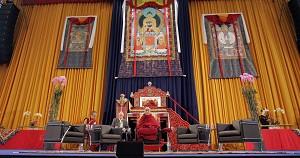HONG KONG—Tibet’s exiled spiritual leader, the Dalai Lama, told Hong Kong media that at the end of June, his special envoys had left for China for the sixth round of the Sino-Tibetan dialogue.
The Dalai Lama said in a recent interview with Asia Week, that in recent years the Chinese government has made many investments in Tibet, including the construction of a railway. The Tibetan people are no longer faced with material difficulties, but most Tibetans are still not satisfied with the human rights situation in Tibet, as they have no real autonomy. They dare not complain of their slavery to the Chinese government for fear of suppression. They can only complain to the Dalai Lama, and hope that he can reflect those complaints to the authorities.
He added that Beijing authorities have sent troops to Tibet. This has certainly deepened the Tibetans’ suspicions and mistrust of the authorities, and could also affect China’s image in India and other Asian countries. Therefore it serves no good to either Tibetan or Chinese people. He hoped that the Chinese government would be aware of the existence of the issue of Tibetan sovereignty. “We must find a way to settle this problem.” he said.
Seeking a solution to the Tibet issue, four special envoys of the Dalai Lama flew to China from June 29 to July 5 for the sixth round of discussion with officials of the United Front Work Department of the Chinese Communist Party (CCP). In Shanghai and Nanjing cities, the two parties held discussions for nine hours over six days. However, as the Dalai Lama’s representatives were still focused on concerns related to the Greater Tibet and Tibet’s autonomy, while the CCP’s representatives insisted that the “Tibet issue does not exist, only the Dalai Lama issue can be discussed,” the six round of the dialogue deadlocked and no progress has been achieved on the issue.
The Dalai Lama pointed out that if the majority of Tibetans were happy, satisfied, and without complaint, they wouldn’t need to ask anything of, or even say “Thank you” to the Chinese government. He hopes that if he can return to Tibet one day, he would like to advocate for care, justice, and love, as Archbishop Desmond Tutu in South Africa did. Although the Dalai Lama hopes very much to return to Tibet, he indicates that Beijing authorities do not allow this to happen.
The Dalai Lama also quoted the officials in the sixth round of discussions saying that “the Dalai Lama is not allowed on his own authority to visit Beijing or Tibet or to go for a pilgrimage to Wutai Mountain, because he and Tibet are inseparable.”
On the issue of reincarnation, the Dalai Lama said that he is on exile abroad, and therefore his future reincarnation should be outside of China. He said one should live in the present and do meaningful things all of his life.
As for the Chinese authorities’ new law requiring government permission for the reincarnation of lamas, the Dalai Lama questions, “Why are reincarnated lamas or Living Buddhas selected by such a Party which does not believe in but rather suppresses, and destroys Buddhism. This is absurd.”


